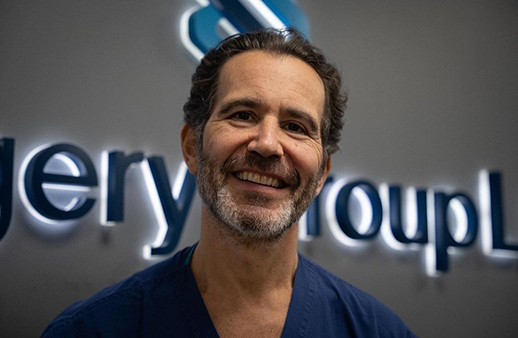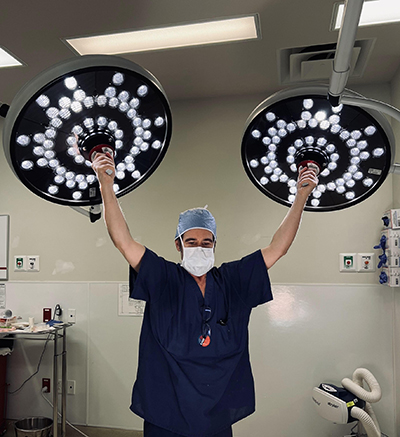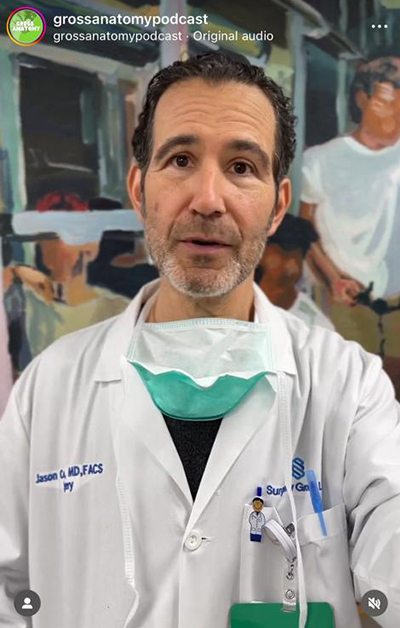Alum performs life-changing work on TV’s ‘Take My Tumor’
Jason Cohen ‘91 specializes in thyroid surgery

When Dr. Jason Cohen ’91 met Amy, she had a lump on her back the size of a watermelon. She couldn’t wear a normal bra, had to buy larger clothes than normal and referred to the lump as her “third boob.”
That lump was actually a lipoma: a fatty tumor often situated between the skin and underlying muscle layer. Thanks to Cohen, a surgical oncologist specializing in thyroid and parathyroid surgery, Amy’s lipoma is no more. Cohen removed it during an episode of Take My Tumor, a TLC series on which world-renowned surgeons remove tumors from patients with extreme cases.
“I tend to see a lot of those, and soft tissue masses are actually pretty common too,” Cohen says of Amy’s case. “Those that get that big are rare, and those that turn into cancers are even rarer. But for someone like me, it’s not a rare thing. It’s a decent amount of my practice.”
Cohen appeared in two other episodes (the six episodes first aired in April and May 2024), helping to remove a tumor from one woman’s backside that kept her from dating and another from a woman’s shoulder that was so large it led her to retreat from the public eye.
“It’s life-changing. It gives people their life back,” Cohen says. “And it’s certainly a relief when it turns out not to be cancer. But even when they’re cancer, often it’s treatable.”
According to Cohen, 1–5% of the population develops soft tissue tumors. The tumors can often be removed, but the bigger issue is whether or not they can be removed safely. Cohen says it all comes down to proper planning.
“It’s more about making sure you’re prepared for all the things that need to be done to remove it,” he says. “With ones that are intra-abdominal, especially if they’re cancers, you have to be prepared to potentially remove organs that it’s attached to. Or with a cancer that’s growing on the soft tissue somewhere, you might have to be prepared to remove surrounding muscle, or even possibly remove some nerves, or sacrifice some nerves potentially, to get things out.”
The producers for Take My Tumor, the same team behind the popular Dr. Pimple Popper series on TLC, reached out to Cohen during the pandemic after stumbling upon his podcast, “Gross Anatomy,” in which he discusses pop culture and how it relates to medicine. The podcast celebrated its sixth anniversary this year.
“One of the reasons I started the ‘Gross Anatomy’ podcast is to find a creative/ artistic outlet,” says Cohen, who majored in art and performed in mainstage theater productions at Binghamton University. “But it was also a little bit from people who would see something in pop culture in a movie, and they’d be like: ‘Does that really happen?’ Or they hear about something going on in the world and think, ‘Is that really true? How does this really work?’”
It also didn’t hurt his chances with TLC that Cohen is a popular face on social media. On Instagram, he’s known as The Thyroid Guy, where he answers questions on thyroid surgery, surgical risks, weight-loss drugs and more. He runs a private practice at Cedars-Sinai Medical Center in Los Angeles and uses the account to market himself.
“I thought I would be a university-based academic surgeon,” Cohen says. “I never thought I’d have the focus on marketing and social media, never in a million years. But I am. I became that guy.”
Once the show was greenlit, the producers put out a call for people with extreme tumors who were looking to have them removed. Potential patients were then submitted to Cohen and the other surgeons on the show for consideration.
“Some of the people weren’t necessarily surgical candidates, or some of them were going to be way too complex a type of surgery, and even if they could have been surgical candidates, a potentially too risky, life-threatening type,” Cohen says. “Each of us narrowed it down to those patients that we felt we could do in the appropriate setting and things would go OK, even knowing that there were going to be challenges.”
The film crew was there to shoot pre-operation (where patients met with Cohen to discuss the procedure), during the actual surgery, and post-operation (where patients were often beaming with joy over the results).
“It was very coordinated,” Cohen says. “The film crew took over the whole office. I had to make sure my partners were going to be OK with it, and that the rest of my partners weren’t going to be too busy and on two other patients that day. Just a little bit of footage takes hours.”
Cohen enjoyed his experience and says it was fun, but there was one drawback. He likes to listen and sing along to music in the operating room, but due to copyright issues, no music was allowed during filming.
“It was the worst thing about doing the show,” he says. “When we were operating, I had to listen to my own thoughts, or I did a lot of talking to [the crew], and they’re narrating what I was doing. But that was a funny thing that I didn’t realize. That was kind of a bummer.”
While Cohen enjoyed his time with the show, he’s never thought of himself as a guy in front of the camera and would prefer to be behind the scenes, consulting for medical shows. Until that consulting gig takes off, Cohen is happy at his current job — and he’s got even more to be proud of. He helped to create a pre-med program at Cedars-Sinai that’s been around for a decade.
But if Take My Tumor wants him back, Cohen is game for more.
“I’m in total limbo, but I’m open for other things if anyone wants to reach out,” he says.
Speaking of reaching out, Cohen hopes that people watching the show learn that it’s important to seek advice if something’s wrong. A small, quarter-size tumor can quickly develop into something large and life-changing.
“All of the patients on the show were embarrassed, ashamed, afraid to get help,” he says. “It’s important to be an advocate for oneself, and to have other people on your team advocating for you as well. And don’t go it alone.”
Cohen also stresses that it’s important to not always take no for an answer. Get a second, third, or even fourth opinion.
“Even if you know it’s not cancer … it doesn’t mean you ignore it. I have patients with small soft-tissue growths who I see once or twice a year to keep an eye on [the growth], to make sure it doesn’t grow. And I tell them, as long as it’s not symptomatic, as long as it’s not growing and doesn’t look worrisome, and as long as it’s less than a certain size, we potentially can just keep an eye on it. But I say to them: ‘You know, I’m going to be seeing you for the next 100 years, keeping an eye on you.’”


